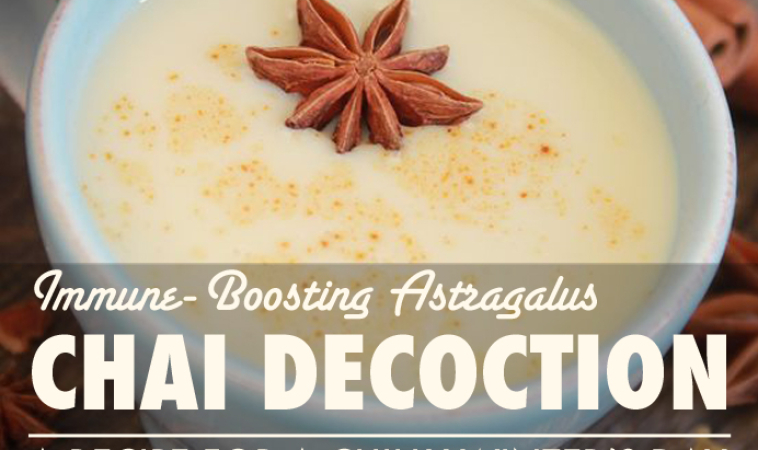It’s hard to imagine anything more comforting than enjoying a warm cup of Chai on a chilly winter’s day. Although perhaps when you add even more immune-supportive herbal healing to it’s already delicious & therapeutic base the whole affair is elevated to become even more gratifying, most especially when everyone around you seems to be catching a case of the sniffles.
Herbal medicine can be of enormous help to our systems during the winter months
Many herbs can be used in acute infectious disorders (e.g. colds & flus) or when infectious states appear more frequent or prolonged. They help move our bodies towards a state of harmony, both easing our symptoms and preventing the recurrence of dis-ease by enhancing the immune system and it’s ability to respond to pathogens. Incredibly, herbs can do all of this and more while simultaneously stimulating our senses & pleasure centers, and all within one simple cup of Chai.
Though some leading coffee outlets have popularized heavily sweetened and/or instant versions of this traditional Indian beverage, the origin of Masala Chai translates into “mixed-spice tea” and was primarily viewed as an herbal medicine rather than a recreational beverage. Although there is no fixed recipe for Chai herbs & spices, most commonly used are all highly aromatic with black tea being used as a base (however rooibos and other non-caffeinated herbs can of course be used, too) making the potential variations for Chai truly endless.
The most medicinal form of Chai is prepared by decoction
The most medicinal form of Chai is prepared by decoction, a process that involves a slow and gentle simmering in water of tougher or hardier plant materials such as roots, barks, seeds & pods in order to best extract their medicinal properties. Herbs most commonly used in Chai blends include those that are rich in volatile oils, which are plant compounds responsible for their distinctive odour and aromas. When taken internally volatile oils have numerous beneficial therapeutic effects towards our immune, digestive, and nervous systems, often acting as antimicrobials, anti-inflammatories, carminatives, diaphoretics and nervine relaxants, not to mention they smell and taste wonderful too!
| Fig. 1 Herbal Actions of Volatile Oils | |
| Herbal Action | Therapeutic Effects |
| Antimicrobial | Help the body destroy or resist pathogenic microorganisms. Will aid the body in strengthening its own resistance while throwing off illness and in general help support the natural immune process. |
| Anti-inflammatory | Reduce inflammation by supporting the body’s natural inflammatory processes and encouraging the chemical mediators involved in their cleansing work thereby speeding the healing process. |
| Carminative | Stimulate the digestive system to work properly and with ease. Are soothing and settling to the gut wall, thereby easing gripping pains and helping with the removal of gas from the digestive tract. |
| Diaphoretics | Will produce or promote sweating through the dilation of surface capillaries and sweat glands, thus helping in poor circulation, elimination of waste, and supporting the body’s natural immune process during fever. |
| Nervine Relaxant | Will ease stress, tension, and anxiety and promote an overall relaxation of the psyche. In high doses may act as sedatives or hypnotics. |
What makes this recipe particularly helpful for supporting the immune system is the addition of the deep immune modulating herb Astragalus (Astragalus membranaceous), an ancient root with subtly sweet & pungent qualities. Deep immune tonics or modulatorsare an important group of herbal remedies that will “feed” or strengthen our immune systems, and Astragalus in particular has demonstrated an ability to increase the production of white blood cells, while decreasing the incidence and shortening the duration of infections.The choice of volatile oil-rich herbs most commonly used in Chai includes a combination of warming and intensely flavourful herbs such as Ginger, Cardamom, Cinnamon, Star Anise, Fennel seed, Peppercorns, Nutmeg and Cloves. As previously mentioned the variations between recipes are incredibly diverse, and I encourage you to get creative and adapt a version that’s best suited to your own unique tastes. However when starting out it helps to follow a recipe at least once before shaping your own blend. The recipe included below highlights some of my own personal favourites such as cinnamon, orange peel, and cardamom, with a nice spicy kick from both ginger & black peppercorns.
Treat the body as whole
As always, when using herbal therapies our intention is to treat the body as whole, integrating and uplifting our mental, emotional and physical state. By incorporating herbs such as those found Chai more regularly into our daily lives we gain access to an ancient, relevant, and effective healing technique that is inherently in tune with Nature.
Happy Herb’ing!
Dr. Marisa Marciano, ND
Recipe for Astragalus Chai Decoction
Ingredients:
- 2 Cinnamon sticks
- 2 tsp Cardamom pods
- 1 tsp Cloves
- 1 tsp Star of Anise
- 1 tsp dried Orange Peel
- ½ tsp Black peppercorns
- ½ Cup finely sliced fresh Ginger or 2 tsp dried Ginger root
- 5 g Astragalus root
- 2 bags Earl Grey tea (or non-caffeinated tea of choice)
- 8-10 cups water (depending on desired strength)
- Optional:
- 2 tsp Honey
- ¼ cup Coconut milk to taste
Instructions:
- Break herbs into smaller pieces if possible and placed in a large glass or ceramic pot (avoid using aluminum)
- Add water & cover with lid
- Bring herbs to a boil, then simmer for a minimum of 20 minutes (Note: you can simmer for much longer, in fact leaving it overnight in a crockpot on a low setting makes for a wonderful smelling kitchen in the morning).
- Strain off herbs while still hot, rinse your pot and return liquid to stove over low heat
- Add honey and/or coconut milk if desired until dissolved
- Drink 1 cup up to 3 times per day
- Yields 5-6 cups
- Can be kept in the fridge for up to 3 days and warmed as needed
References:
- Rosen, D. Chai: The Spice Tea of India. Pownal, Vermont: Storey,1999.
- Marciano, M. Volatile Oils. Thenaturopathicherbalist.com. http://thenaturopathicherbalist.com/plant-constituents/volatile-oils/. 2014.
- Bone, K. & Morgan, M. Professional Review: Astragalus membranaceous — Astragalus. MediHerb, February 1999, No. 67, pp. 1- 4.
- Fu, J., et al. (2014). Review of the botanical characteristics, phytochemistry, and pharmacology of Astragalus membranaceus (Huangqi). Phytother Res, 28(9):1275-83.
- Ren, S., Zhang, H., Mu, Y., Sun, M., Liu, P. (2013). Pharmacological effects of Astragaloside IV: a literature review. J Tradit Chin Med,33(3):413-6.
*****
 Dr. Marisa Marciano is a licensed ND in private practice at Evoke Integrative Medicine in downtown Vancouver BC where she focuses on the use of custom herbal formulations alongside dietary & lifestyle counselling to achieve meaningful results for her patients. Also an academic & clinical faculty member at BINM, Dr. Marciano is a passionate educator for the power of plant medicine and is creator of the popular online resource ‘TheNaturopathicHerbalist.com’, which integrates traditional herbal wisdom with contemporary medical research, and empowers others to achieve health by reconnecting with ancient & effective “ecological healing” techniques that are inherently in tune with Nature.
Dr. Marisa Marciano is a licensed ND in private practice at Evoke Integrative Medicine in downtown Vancouver BC where she focuses on the use of custom herbal formulations alongside dietary & lifestyle counselling to achieve meaningful results for her patients. Also an academic & clinical faculty member at BINM, Dr. Marciano is a passionate educator for the power of plant medicine and is creator of the popular online resource ‘TheNaturopathicHerbalist.com’, which integrates traditional herbal wisdom with contemporary medical research, and empowers others to achieve health by reconnecting with ancient & effective “ecological healing” techniques that are inherently in tune with Nature.
















